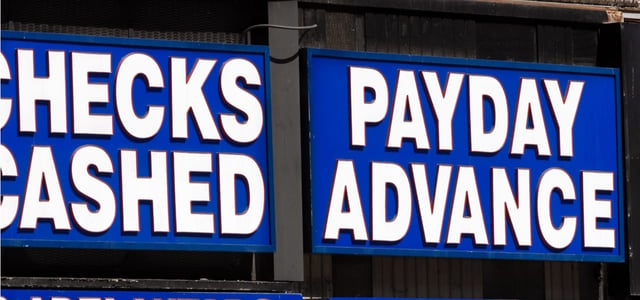The United States has no shortage of available lenders. Some are financial institutions that offer many different products and services, while others are more narrow in scope. They may be for-profit, nonprofit, or even peer to peer.
It is important to approach the best lender for your needs and credit rating when you want to borrow money. Thankfully, you have plenty of options from which to choose.
Here are 14 types of lenders you should know about and why you would approach them for business.
1. National Banks
National banks include notables such as Wells Fargo, JPMorgan Chase & Co., and Bank of America. These publicly traded corporations collect funds from customers in the form of checking and savings deposits.

The bank combines the deposits to issue loans, lines of credit, and credit cards with a portion of that money. Therefore, as a depositor, you are lending money to borrowers.
Pros: National banks offer top-of-the-line websites and applications. Service is swift and automated. They have a large suite of deposit accounts and investment products as well as home, car, personal, and business loans. So if you want to do all of your financial business in one place, it may be convenient to go with a national bank.
Cons: Credit and loan applications and management can be impersonal. In general, you won’t get a lot of hand-holding with national banks and may not speak with the same person twice.
2. Community Banks
Community banks are locally owned and operated financial institutions. They understand and respond to the residents of a specific jurisdiction or demographic. For example, F&M Bank in Lodi, California, focuses on the area’s agriculture industry, and Citizens Trust Bank was started in 1921 to serve the African American customer base in Atlanta, Georgia.
Pros: Some community banks offer favorable interest rates on interest-bearing accounts, such as savings accounts and certificates of deposit, as well as on loans that you take out. Community banks can be more forgiving if you have no credit or bad credit and are more likely to offer individualized attention.
Cons: All community banks offer loans, but many do not issue credit cards. Depending on the financial institution, they may have rudimentary online capabilities and limited branch accessibility.
3. Credit Unions
Credit unions are member-owned, not-for-profit financial institutions. Membership begins when you open a deposit account, after which you can take advantage of the diverse financial services a credit union offers.

Some credit unions are for people (and their families) of a certain occupation, such as the military, while others serve residents of a city or state, such as OUR Credit Union for Michigan communities. In addition to savings and checking accounts, credit unions offer a variety of loans, and some issue credit cards.
Pros: Credit unions have a collective mission to educate and support their members. They are renowned for offering low fees and excellent interest rates on credit products. If your credit rating is too low to qualify for financing, it will work with you so you can eventually borrow at a rate that won’t hurt your bottom line.
Cons: Credit unions may only have one or a limited number of physical branches, so that may be burdensome if you prefer in-person banking. The technology at very small credit unions may not be as advanced as technology at the larger credit unions or national banks.
4. Mortgage Companies
Mortgage companies are financial firms that underwrite and provide mortgages to home buyers. They also refinance existing home loans. As with banks and credit unions, mortgage companies are direct lenders. However, they don’t offer deposit accounts, other types of loans, or credit cards.
Pros: Because mortgage companies specialize in home loans, they may offer a greater span of mortgage types. Some mortgage lenders have lenient qualification requirements, so you may have more options if your credit isn’t perfect.
Cons: Most mortgage companies do not service the loans they originate, so you will most likely work with another company after you obtain the loan. The original terms will remain the same, but if problems arise, you may not get the same level of care as you would with a bank or credit union.
5. Finance Companies
Finance companies do not offer any deposit accounts. Instead, all they do is issue loans. Their funding doesn’t come from customers or members’ deposits but from commercial banks and the Federal Reserve System.

Finance companies borrow money from these sources at a low rate and then lend it at a higher rate. You may work with a finance company when you purchase furniture or appliances from a department store.
Pros: Because finance companies only issue loans, the process is typically smooth and fast. If you have good credit, the interest rates may be better than on loans you would get from other lenders. For example, you may get 0% financing if you satisfy the balance within a certain number of months.
Cons: Many finance companies lend to individuals who have damaged credit ratings, but the interest rates will be very high. If your credit isn’t good or established, beware the ultimate cost. Also, if the interest is deferred and you don’t pay the entire debt by the end of the promotional term, all the interest you would have incurred will be added to the bill.
6. Mission-Based (or Micro) Lenders
Non-traditional, mission-based lenders offer loans to small businesses. They do not offer credit cards or deposit accounts. The idea is to support local economies, help minority borrowers, and support low-income areas.
Lenders may be government organizations, such as Community Development Finance Institutions, or nonprofit organizations like Kiva. The loans tend to be very flexible and give borrowers the option to only pay interest for a set period.
Pros: You may be eligible for special funding if you fit the criteria for eligibility. Your credit rating may be irrelevant or less important.
Cons: The application process is rigorous, and it can take a couple of months for the loan to be issued.
7. Major Credit Card Issuers
Banks and credit unions issue credit cards, but for some, it’s a predominant part of their business. Among the largest credit card issuers in the U.S. are American Express, Chase, Citigroup, Capital One, and Discover.

So while these financial institutions do offer a complete array of services, they are widely known for their diverse span of credit cards.
Pros: The bigger credit card issuers tend to have a large number of cards suitable for different credit profiles and lifestyles. Some cards have extensive rewards, others are more basic for the purpose of establishing credit. Personal, business, secured, and unsecured cards can all be offered by a single issuer.
Cons: There aren’t many downsides to taking out a credit card from one of these issuers. But it’s worth checking out the smaller issuers so you know you’re getting the account that suits you best.
8. Healthcare Lenders
Some lenders are set up specifically to help people pay for medical procedures and healthcare costs that aren’t covered by medical insurance.
Lenders, including CareCredit, offer special financing options, such as the ability to borrow money for up to 24 months, on a deferred interest basis. Credit approval is required. Many doctors, dentists, and veterinarians accept payments from these lenders.
Pros: A zero interest installment loan can help you manage the high cost of health care for you or your pet without having to put it on a credit card.
Cons: If you miss a payment due date, the promotional interest rate will likely disappear. And if you don’t pay off the entire balance by the term, all the interest that would have started from the date of purchase will be added to the amount you owe.
9. Online Lenders
There is a dizzying array of online lenders today. Instead of physical branches, you do all of your borrowing business from their websites and apps.

Some are banks, like Ally Bank, and others are credit unions, like Alliant. They offer a full range of checking and savings products in addition to credit cards and loans. Others are just lenders that only offer personal and business loans.
Pros: Comparing many offers online is easy. You apply online with a short form, then receive a response within minutes, if not sooner.
Cons: While it pays to check out online lenders, you may still get a better rate from a traditional bank or credit union. Some online lenders have exceptionally high interest rates, so though you may qualify, the ultimate cost may be prohibitive.
10. Student Loan Lenders
The U.S. Department of Education issues four types of federal student loans, known as Direct Loans, under their William D. Ford Federal Direct Loan Program. Most of these Direct Loans are not based on credit as they are geared towards students. Direct PLUS Loans, which are credit-based, are also available to parents of students. Private student loans, including refinancing, are available from banks, credit unions, and online lenders such as SoFi. Qualification is based on your creditworthiness.
Pros: Federal student loans have long, flexible payment arrangements and you may put payments on hold without inflicting damage to your credit. Interest rates are low and fixed. Private student loans also have very low interest rates.
Cons: Repercussions for defaulting on federal student loans can be severe and can include wage garnishment. These loans are not dischargeable in bankruptcy, so they stick with you until you’ve paid them off. Private student loans aren’t as flexible as federal student loans and the interest rate is variable, so it can go up during the course of the term.
11. Car Dealership Financing
When you take out a car loan through a dealership, the dealer submits your credit application to lenders it has relationships with, and you will be presented with a series of loan options. Each option will include the terms, payments, and interest rates.

Other dealers have in-house financing, which is typically for people with bad or no credit. The signs will say, “buy here, pay here” because they lend the money to borrowers directly.
Pros: If you use a lender that’s connected to the dealer and you have good credit, you may qualify for ultra-low financing, including 0% APR.
Cons: In-house dealership financing can have exceptionally high interest rates. A better option would be to explore what is available to you through another bank or credit union first.
12. Car Title Lenders
Car title lenders offer small loans against the value of your car. Terms are usually 30 days, and the lender holds the title to your vehicle until you repay the loan.
The fee can be as much as 25% of the amount you borrow. A $1,000 loan could cost $250, so you would pay $1,250. Some lenders allow you to roll the debt over for another term, in which case another fee will be added to the debt.
Pros: Because the vehicle serves as collateral, you don’t need to have good credit. In some circumstances, the fee may make sense if it will get you out of a pressing jam.
Cons: Car title loans will be very costly if you roll the debt over. And if you don’t pay at all, the lender has the right to keep the title and take your car.
13. Payday Lenders
Some payday lenders have storefronts and others operate entirely online. Payday lenders allow you to borrow against your next paycheck. Loans are fairly small, such as $500.

You provide a signed check or give permission to the lender to withdraw money from your bank, and then the lender provides you with the cash. The loan is due at your next payday (usually in two weeks). The fee is typically $15 for every $100 you borrow.
Pros: As with a car title loan, a payday loan can make sense when other options don’t exist, and you are certain you will repay the balance when it’s due. There is no credit check.
Cons: Depending on state statutes, you may be able to extend the debt and another fee will be tacked on. If you don’t have enough money in your account to cover the payment, insufficient funds fees will be added.
14. Friends and Family Members
Individuals may also lend you money. These are the most personal of personal loans. Rather than a credit check, friends and family members provide loans based on trust. They know you, your needs, and believe in your ability to repay based on your relationship.
Such personal loans may be set up casually where you repay on an as-needed basis or structured as a formal loan: fixed installment payments with a term. Your friend or family member may even charge fees.
Pros: The money may be available to you immediately and despite not having good credit.
Cons: Not making payments on time or at all can result in serious relationship damage. Also, if you’re trying to rebuild your credit, a well-managed interpersonal loan won’t help.
Choose Your Next Lender Carefully
As you can see, you have a wide universe of companies and people you can approach for loans and credit cards. Choose carefully. No matter who you borrow from, you will want to make sure you can easily handle the payments and any associated fees.
Advertiser Disclosure
CardRates.com is a free online resource that offers valuable content and comparison services to users. To keep this resource 100% free, we receive compensation for referrals for many of the offers listed on the site. Along with key review factors, this compensation may impact how and where products appear across CardRates.com (including, for example, the order in which they appear). CardRates.com does not include the entire universe of available offers. Editorial opinions expressed on the site are strictly our own and are not provided, endorsed, or approved by advertisers.


![7 FAQs: The Different Types of Credit Cards & Which to Carry ([updated_month_year]) 7 FAQs: The Different Types of Credit Cards & Which to Carry ([updated_month_year])](https://www.cardrates.com/images/uploads/2017/11/types.png?width=158&height=120&fit=crop)
![8 Types of Prepaid Cards & #1 Card For Each ([updated_month_year]) 8 Types of Prepaid Cards & #1 Card For Each ([updated_month_year])](https://www.cardrates.com/images/uploads/2021/08/Types-of-Prepaid-Cards.jpg?width=158&height=120&fit=crop)





